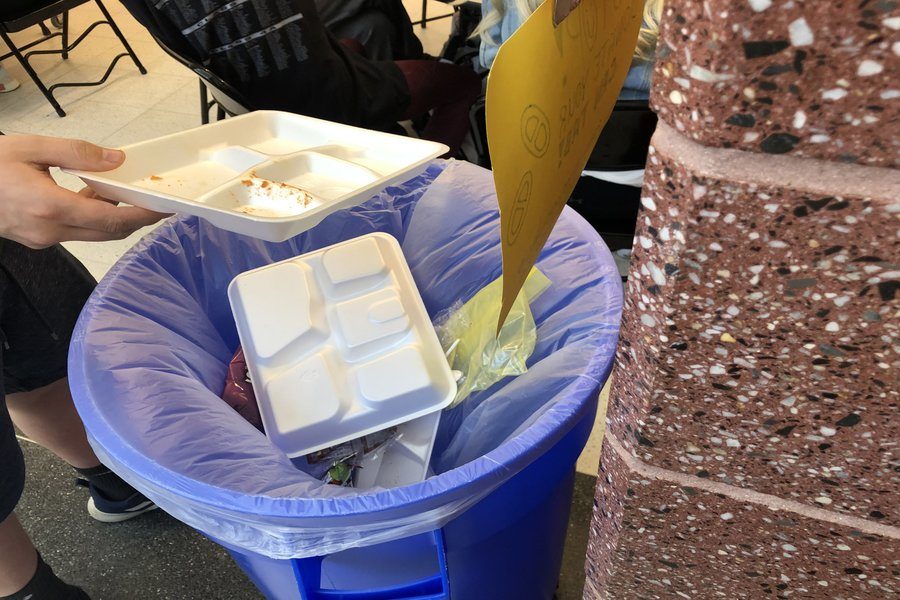Trayless Tuesdays? Will Maryland ban styrofoam from school cafeterias?
Students incorrectly dispose of Styrofoam.
April 10, 2019
Maryland will be the first state to ban polystyrene foam containers as a result of of their long-term damaging effect on the environment. Linganore should incorporate a program such as “Trayless Tuesdays” to better prepare for the change. A popular alternative, paper boats can eliminate the polystyrene foam waste.
New York City schools have saved 90 million polystyrene foam trays that have been eliminated from production, school lunches, incinerators and landfills at no additional costs to the city.
The Maryland General Assembly had approved their own version of the legislation. The state’s Democratic Party dominated the General Assembly to pass the ban this year, but it is still pending action from the Governor.
The ban is planned to begin January 1, 2020, and would ban the use of polystyrene foam by businesses which sell food . Maryland Democrats may choose to accept an amendment that would delay implementation of the ban for six months, meaning it would start in July of next year.
“Provisions for exactly how the mechanisms for enforcement would be implemented are not completely spelled out,” said Barry Glotfelty, director of Environmental Health Services for Frederick County.
Polystyrene foam is a big part of the plastic problem in our oceans. The lightweight foam containers are usually littered to the ground and when they sit on the ground for a while, they soak up toxins. Then the wind carries them to different areas, mainly falling into a body of water.
Polystyrene foam can float down waterways, finding its way into oceans where it is broken down into smaller pieces, causing it to get ingested by marine life. Waters get littered with plastic and marine life can choke on it.
“I have never cried behind a camera before. But it broke my heart to see animals entangled in plastic, albatrosses dying in plastic, dolphins trailing plastic and seals with their noses trapped in parcel tape rolls,” said Rebecca Hoskins, a wildlife camerawoman for the BBC.
“The main things we see are the Styrofoam trays used in the cafeteria. I personally think that using the plastic trays would be a better alternative,” lead custodian Michael Bowles said.
The only benefit of using Styrofoam trays at lunch is the quick clean up process.
“Styrofoam can create issues with the landfill; however, it’s a big time saver in terms of our job and the amount of dishes we generate every day,” Karen Borroughs, cafeteria staff member said.
Senator Cheryl Kagan, a part of the Democratic party, cited a Baltimore study that says “42% of all debris picked up in Baltimore City was foam or foam pieces.”
“We have a duty, I think, to future generations to start seriously curtailing the use of single use plastic,” said Delegate Brooke Lierman, politician in the Maryland Legislature and represents District 46 in Baltimore City.
According to the National Geographic, every year, an estimated 18 billion pounds of plastic waste enters the world’s ocean from coastal regions. This is about equivalent to five grocery bags of plastic trash piled up on every foot of coastline on the planet.
“It cannot be recycled. It doesn’t break down. It doesn’t biodegrade,” Kagan said.
County governments would be responsible to enforce the ban and could impose fines up to $250 per violation, after a first warning and if they don’t correct deficiencies within 3 months.
Several local governments, including Baltimore City, have banned foam products, although the city’s ban isn’t in full effect yet.



